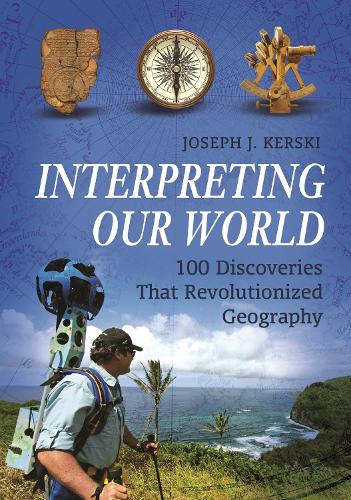
Interpreting Our World: 100 Discoveries That Revolutionized Geography
(Hardback)
Available Formats
Publishing Details
Interpreting Our World: 100 Discoveries That Revolutionized Geography
By (Author) Joseph J. Kerski
Bloomsbury Publishing PLC
ABC-CLIO
17th October 2016
United States
Classifications
Tertiary Education
Non Fiction
910.9
Physical Properties
Hardback
432
Width 178mm, Height 254mm
1134g
Description
This important book demonstrates why geography matters in the modern-day world through its examination of 100 moments throughout history that had a significant impact on the study of geographyliterally, "writing about the earth." Geography is not simply accounts of the lands of earth and their features; it's about discovering everything there is to know about our planet. This book shows why geography is of critical importance to our world's 21st-century inhabitants through an exploration of the past and present discoveries that have been made about the earth. It pinpoints 100 moments throughout history that had a significant impact on the study of geography and the understanding of our world, including widely accepted maps of the ancient world, writings and discoveries of key thinkers and philosophers, key exploration events and findings during the Age of Discovery, the foundations of important geographic organizations, and inventions in digital mapping. The book begins with a clear explanation of geography as a discipline, a framework, and a way of viewing the world, followed by coverage of each of the 100 discoveries and innovations that provides sufficient background and content for readers to understand each topic. The book concludes with a concise synopsis of why it all matters and a look forward to 10 possible future discoveries in the next 50 years of geography. Students will gain a clear sense of what is truly revolutionary about geography, perhaps challenging their preconceived notion of what geography actually is, and grasp how important discoveries revolutionized not only the past but the present day as well.
Reviews
This book potentially fits as a piece of a broader introduction to geography course in the general sense, as it provides interesting descriptions and preludes into more detailed discussions. . . . An upper-level or graduate course might use this work as well, to begin discussions or deeper implications of these revolutions or revolutionaries. . . . Kerski has accomplished in this work an easy-to-use, accessible reference that captures developments in geography quite handily. In each entry, the passion and drive of geographers to better understand our world shines through. * Journal of Geography *
This is an excellent reference for middle school and high school students, and for general readers interested in geography. * Booklist *
The volume is recommended for collections supporting geography, GIS, and cartographic research. Librarians will need to decide whether to place this in the reference area or the circulating collection due to the readability of the material. Some patrons may want to read the volume as a good, general introduction to many lines of inquiry within geography rather than use the volume in a quick consultancy manner in ready reference. * ARBA *
Summing Up: Highly recommended. High school, community college, and undergraduate students; general readers; professionals/practitioners. * Choice *
Author Bio
Joseph J. Kerski, PhD, is a geographer who teaches online and face-to-face courses at primary and secondary schools, through massive open online courses (MOOCs) as well as via universities such as Sinte Gleska University, Elmhurst College, and the University of Denver.
